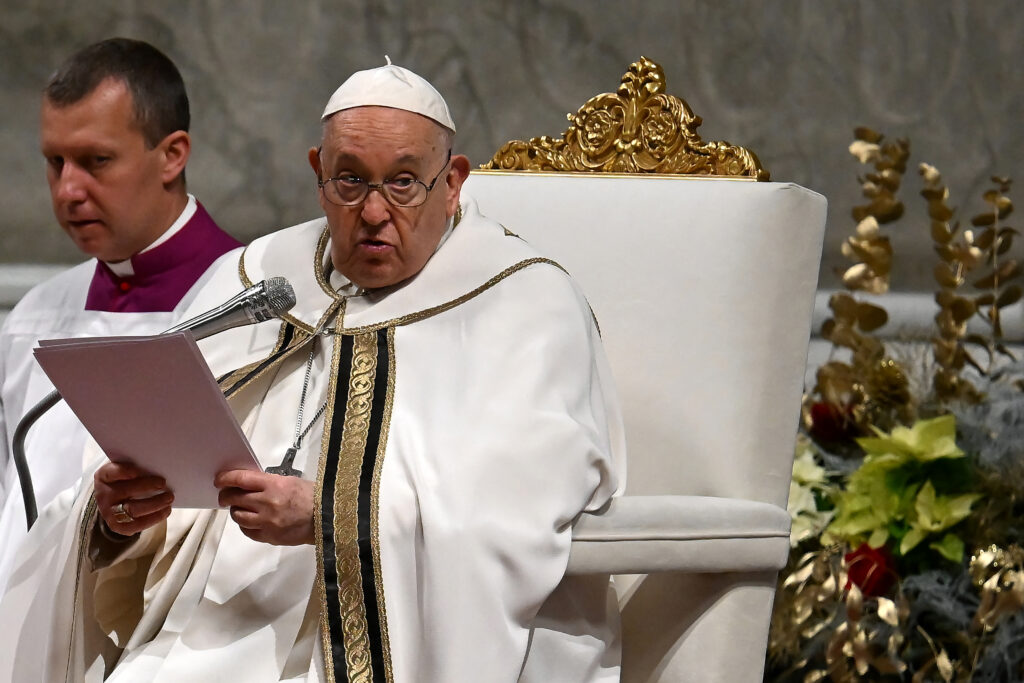Pope urges Catholics to “abandon ecclesial ideologies” in wake of recent controversies

ROME – On Sunday’s Solemnity of the Epiphany the Holy Father lamented that the Church is often split into groups based on various interpretations of the faith and stressed the importance of communion, saying God must be at the centre of faith, rather than one’s own ideas about it.
Pope Francis’s comments came amid a burgeoning controversy over a recent Vatican declaration permitting non-liturgical blessings of same-sex unions, which has revealed strong divisions within Catholicism.
“We need to abandon ecclesial ideologies to find the meaning of Holy Mother Church, the ecclesial attitude. Ecclesial ideologies: no; ecclesial vocation, yes,” he said.
“The Lord, not our own ideas or our own projects,” must be the focus, the Pope added. “Let us set out anew from God; let us seek from him the courage not to lose heart in the face of difficulties, the strength to surmount all obstacles, the joy to live in harmonious communion.“
“Let us set out anew from God; let us seek from him the courage not to lose heart in the face of difficulties, the strength to surmount all obstacles, the joy to live in harmonious communion,” he said.
In his homily Pope Francis said that the Magi, whose visit to the infant Christ today’s feast celebrates, are a reflection of the world’s peoples who are “journeying in search of God … of all those who were lost and now hear the beckoning of a friendly voice.”
Focusing on three aspects of the biblical narrative of the Magi, Pope Francis noted that they are described as having their “eyes are raised to the heavens.”
The Magi “do not pass their lives staring at their feet, self-absorbed, confined by earthly horizons, plodding ahead in resignation or lamentation,” but rather, they “lift their heads high and await the light that can illumine the meaning of their lives,” he said.
“If we remain closed in the narrow confines of earthly things, if we waste away, heads bowed, hostages of our failures and our regrets; if we thirst for wealth and worldly comforts rather than becoming seekers of life and love, our life slowly loses its light,” he said.
What the Magi illustrate is the necessity to fix one’s eyes on heaven in order to discover the meaning of life, the Pope said, adding that humanity needs God’s word and friendship to move forward.
“We need to set out on this journey, so that our faith will not be reduced to an assemblage of religious devotions or mere outward appearance, but will instead become a fire burning within us, making us passionate seekers of the Lord’s face and witnesses to his Gospel,” he said.
Noting how the Magi also completed a journey on earth, the Pope said they chose to follow God’s sign in the star, and ultimately their journey culminates in finding God “in man, in a little child lying in a manger.”
“That is where the God who is infinitely great has revealed himself: in the little, the infinitely little,” he said, and stressed the importance of journeying in the world as witnesses to the Gospel.
Jesus was given to the world, Pope Francis said, “not to warm our nights, but to let rays of light break through the dark shadows that envelop so many situations in our societies”.
In this sense, he said, God is found “not by basking in some elegant religious theory, but by setting out on a journey, seeking the signs of his presence in everyday life, and above all in encountering and touching the flesh of our brothers and sisters,” just as the Magi themselves found a real child.
“This is important: to find God in flesh and bone, in the faces of those we meet each day, and especially in the poor,” Francis said, saying this encounter with God opens faithful to something bigger and “makes us change our way of life and transform our world”.
Pope Francis also reflected on how the Magi, after finding the infant Jesus, bowed down in adoration before him.
“They observe the star in the heavens, but they do not take refuge in otherworldly devotion; they set out, but they do not wander about, like tourists without a destination,” he said.
When the Magi found Jesus, they gave him gifts that point to his identity not as a powerful king, but as a king “who came to serve us, a God who became man, who has mercy on us, suffers with us and dies for us,” he said.
Like the Magi, believers are also called to “bow our heart and bend our knee in worship: to worship the God who comes in littleness, who dwells in our homes, who dies for love,” the pope said, urging faithful to “rediscover our taste for the prayer of adoration.”
“We have lost the attitude of adoring, we have lost the ability to adore… Let us acknowledge Jesus as our God and Lord, and adore,” he said.
Pope Francis closed his homily urging believers to pray for the grace to “never to lose courage: the courage to be seekers of God, men and women of hope, intrepid dreamers, gazing at the heavens and journeying along the roads of this world, in order to bring to all the light of Christ, which illumines every man and woman.”
What's Your Reaction?












